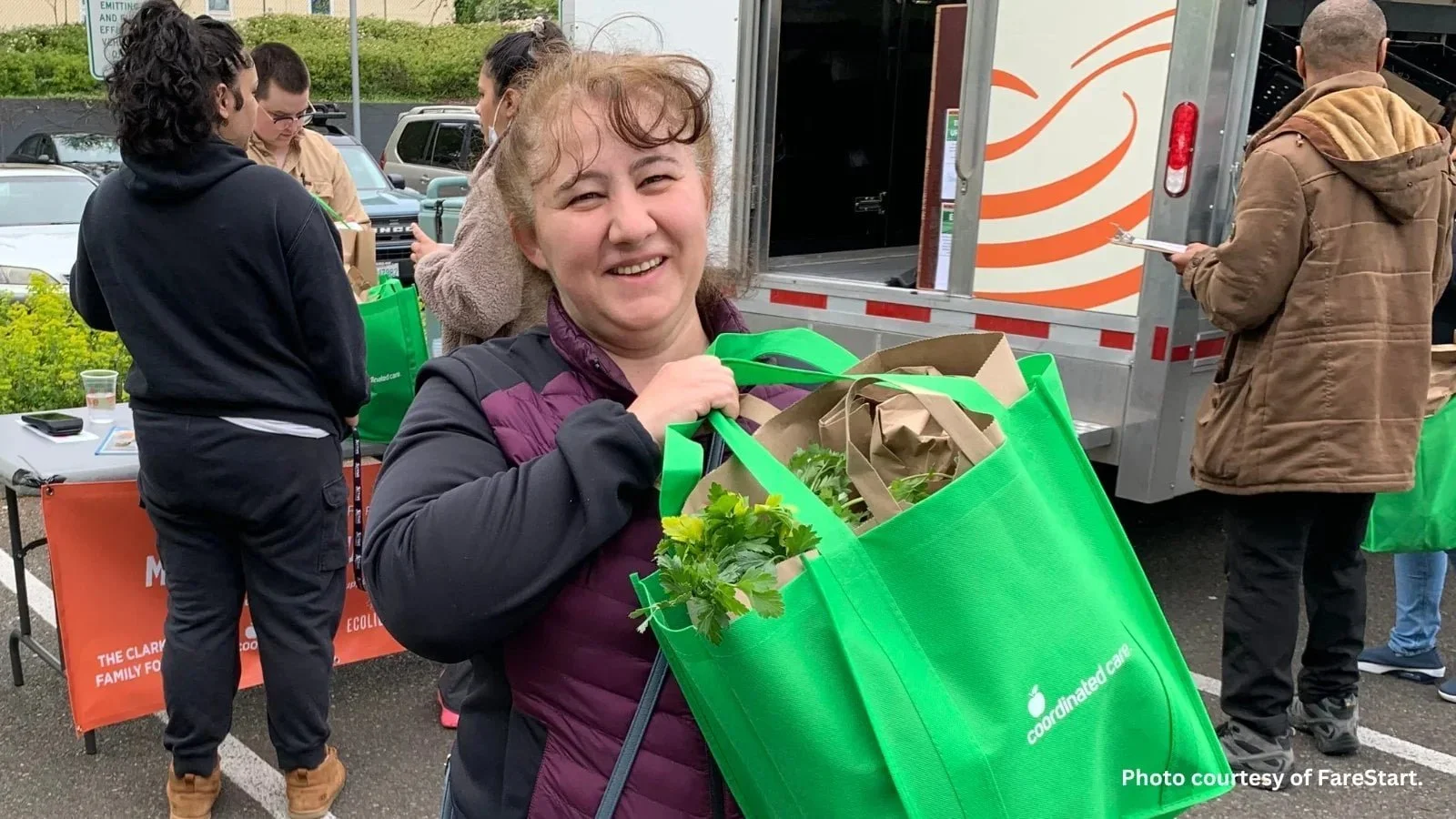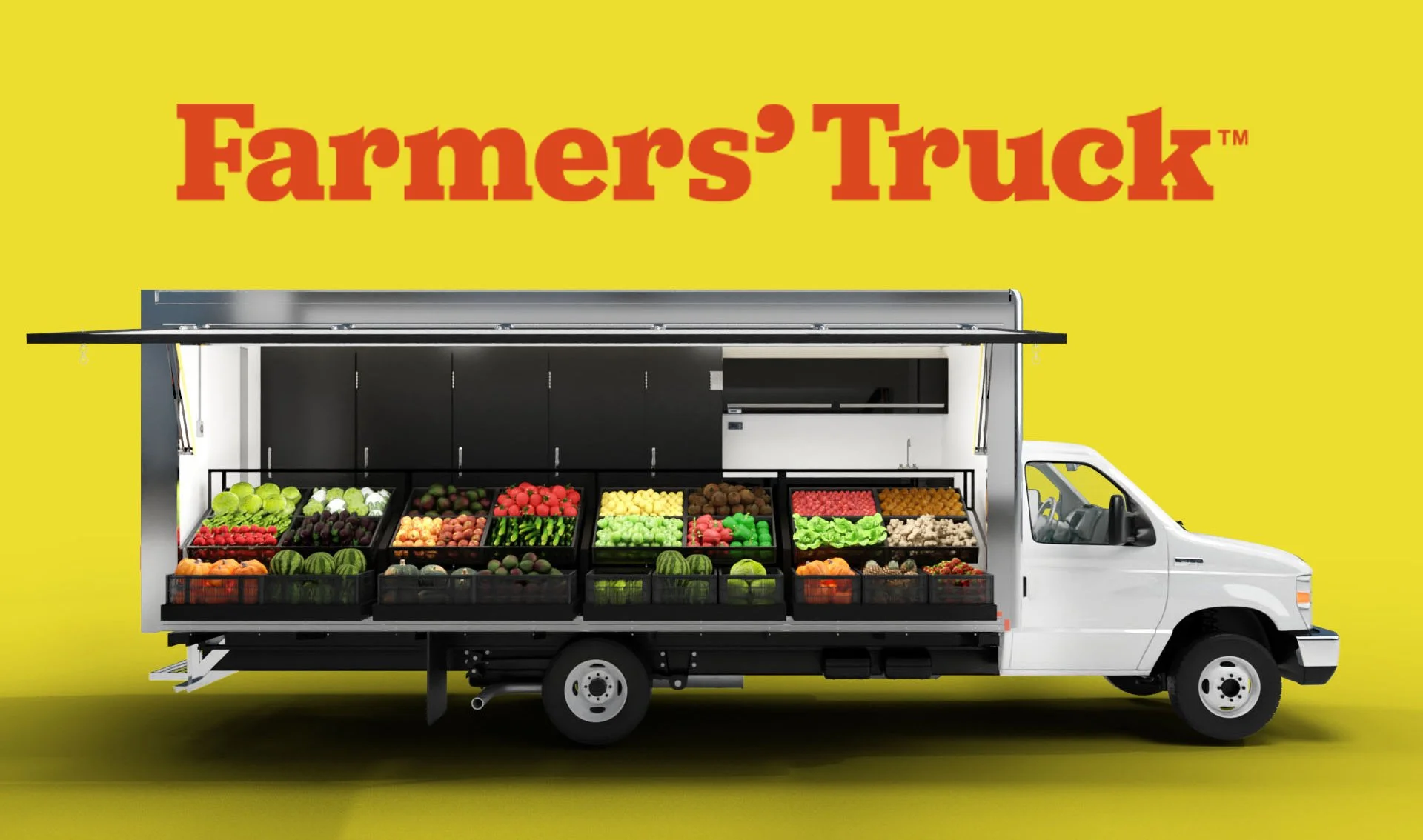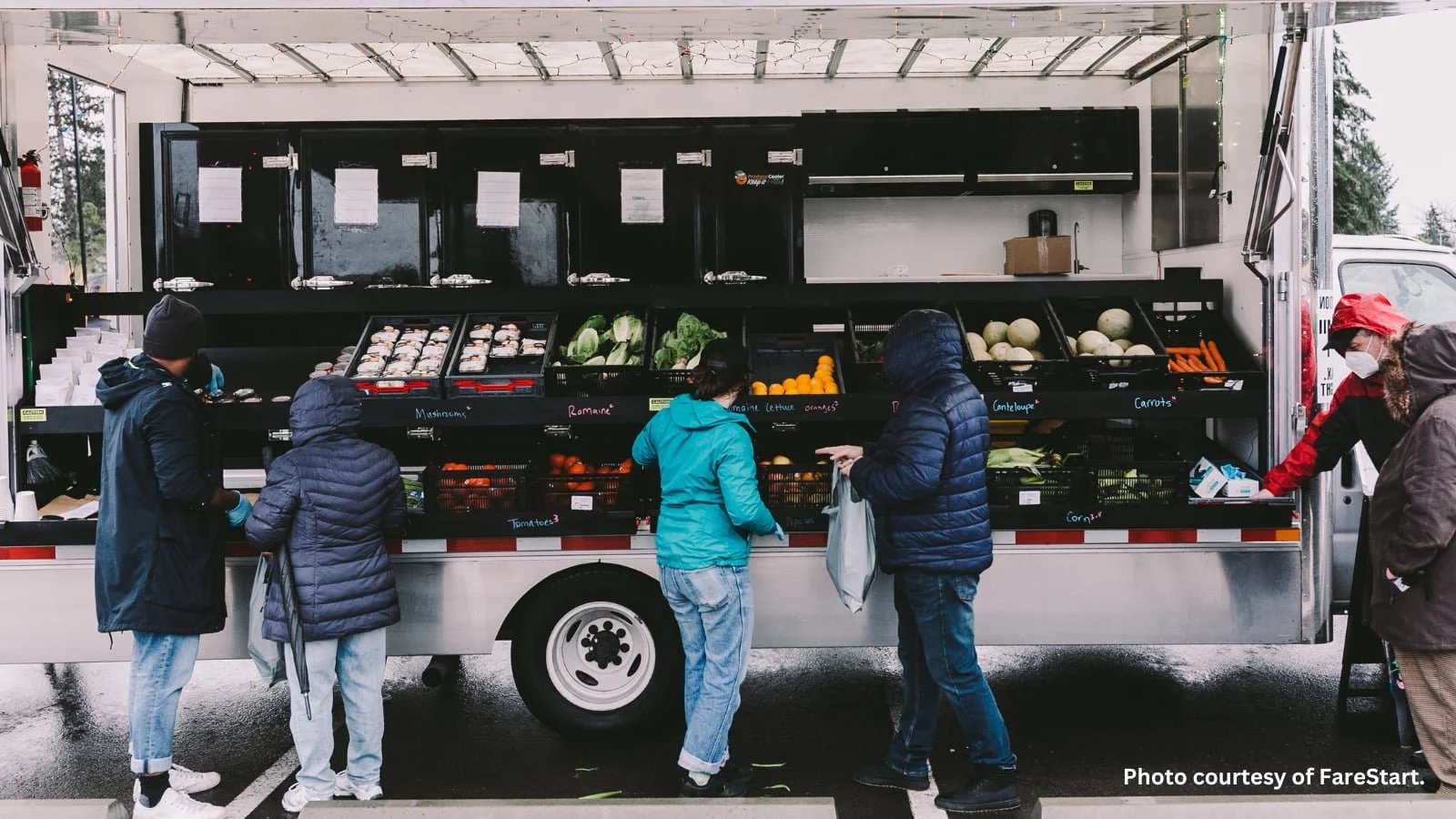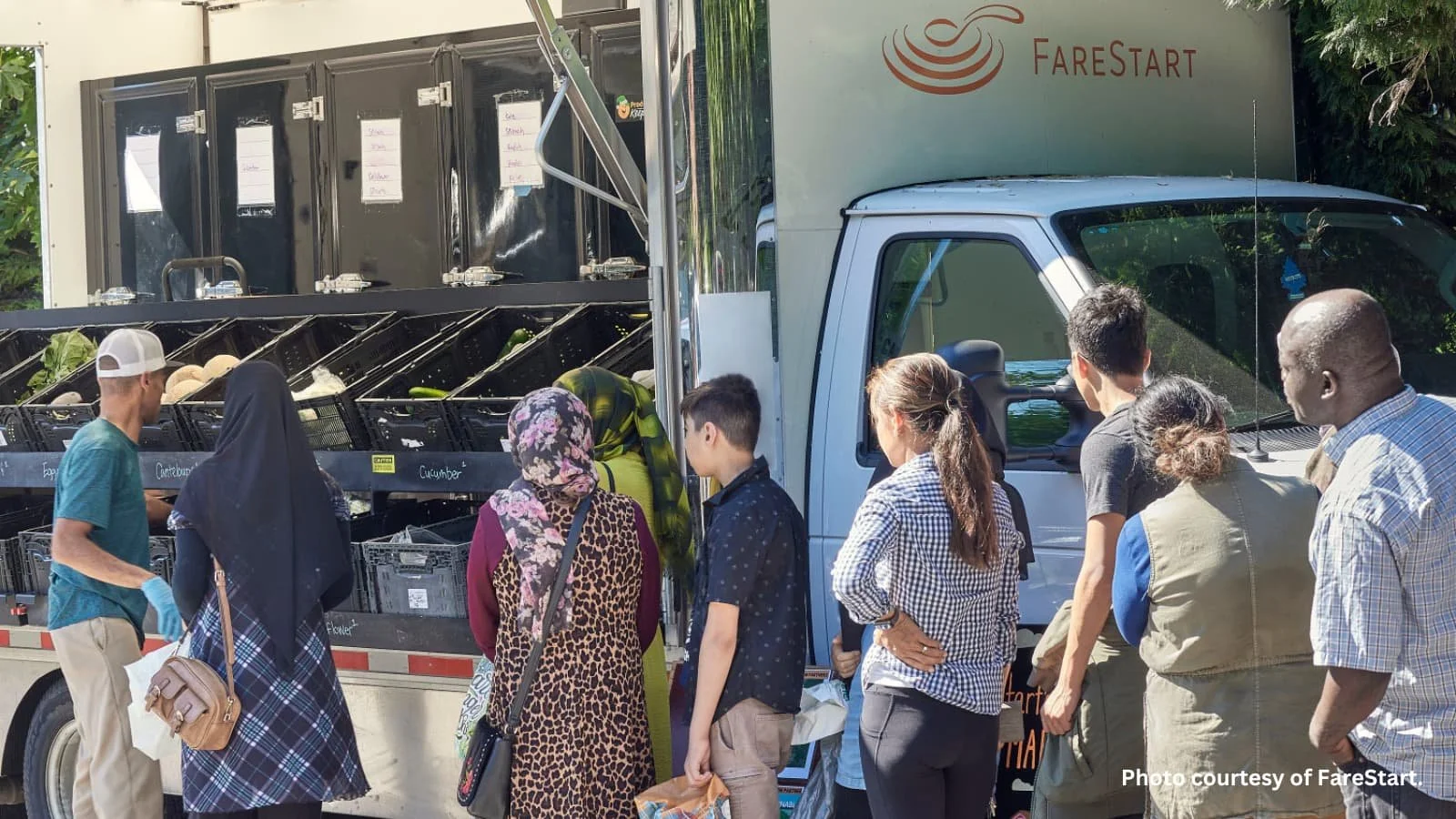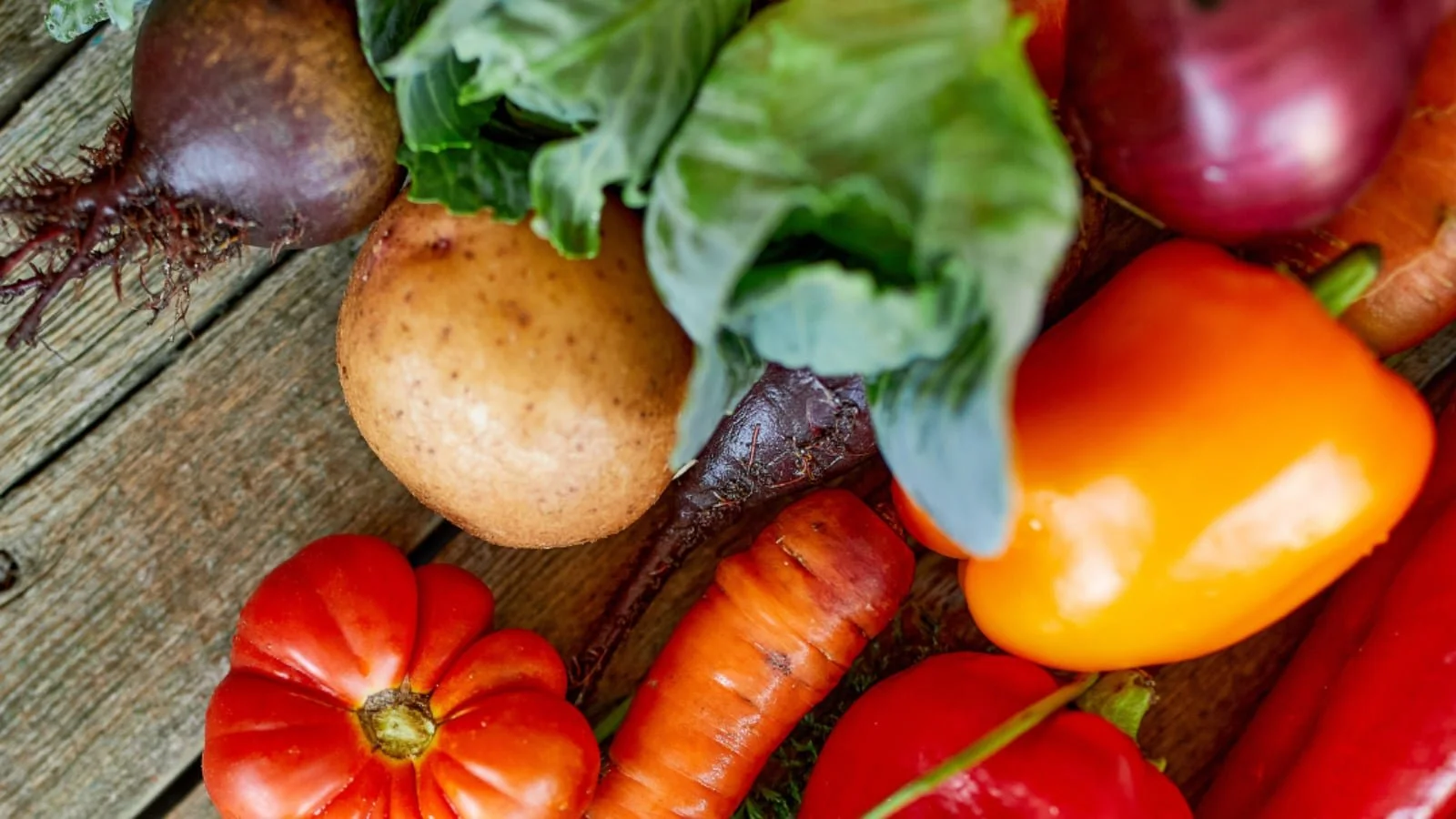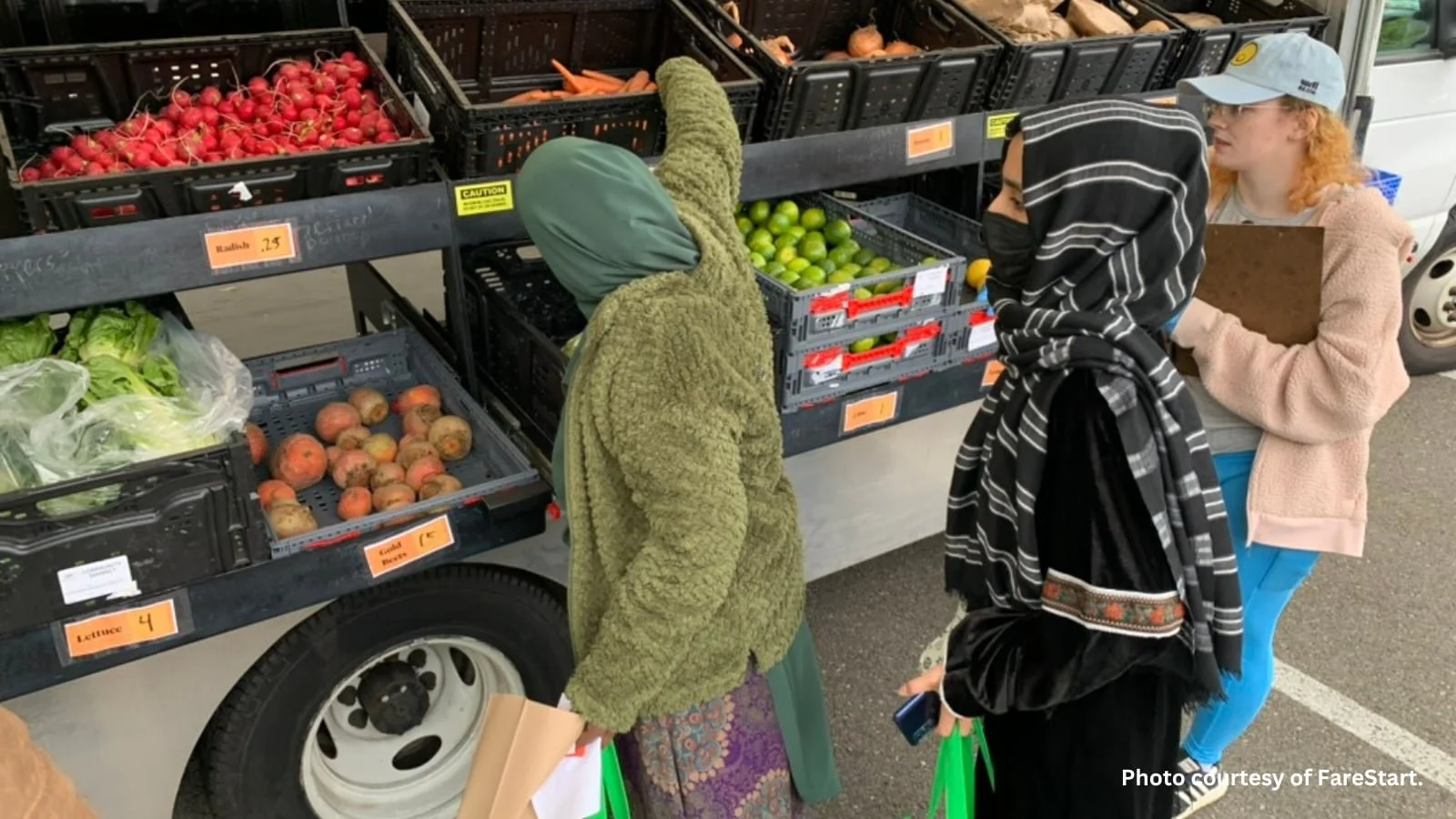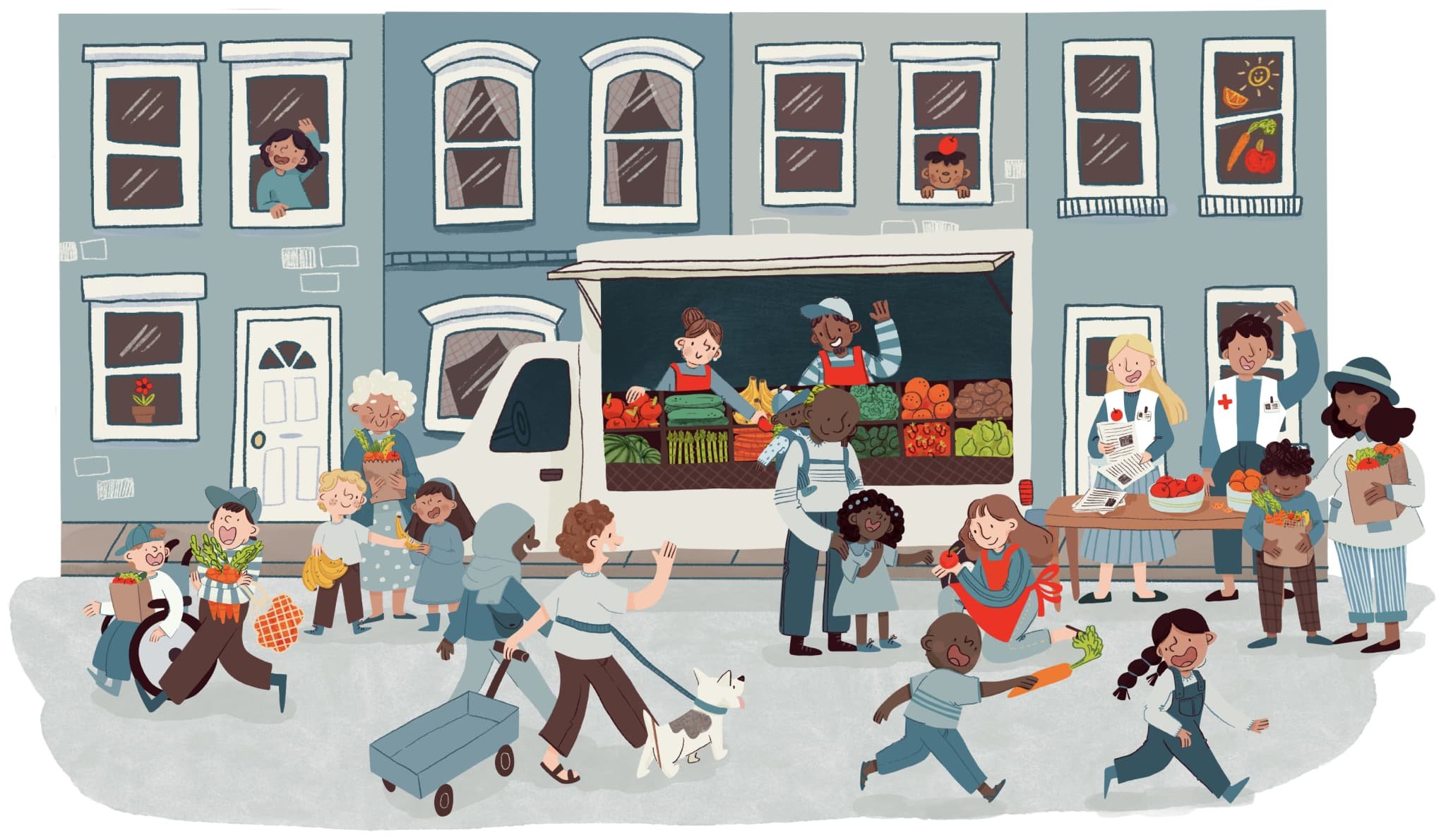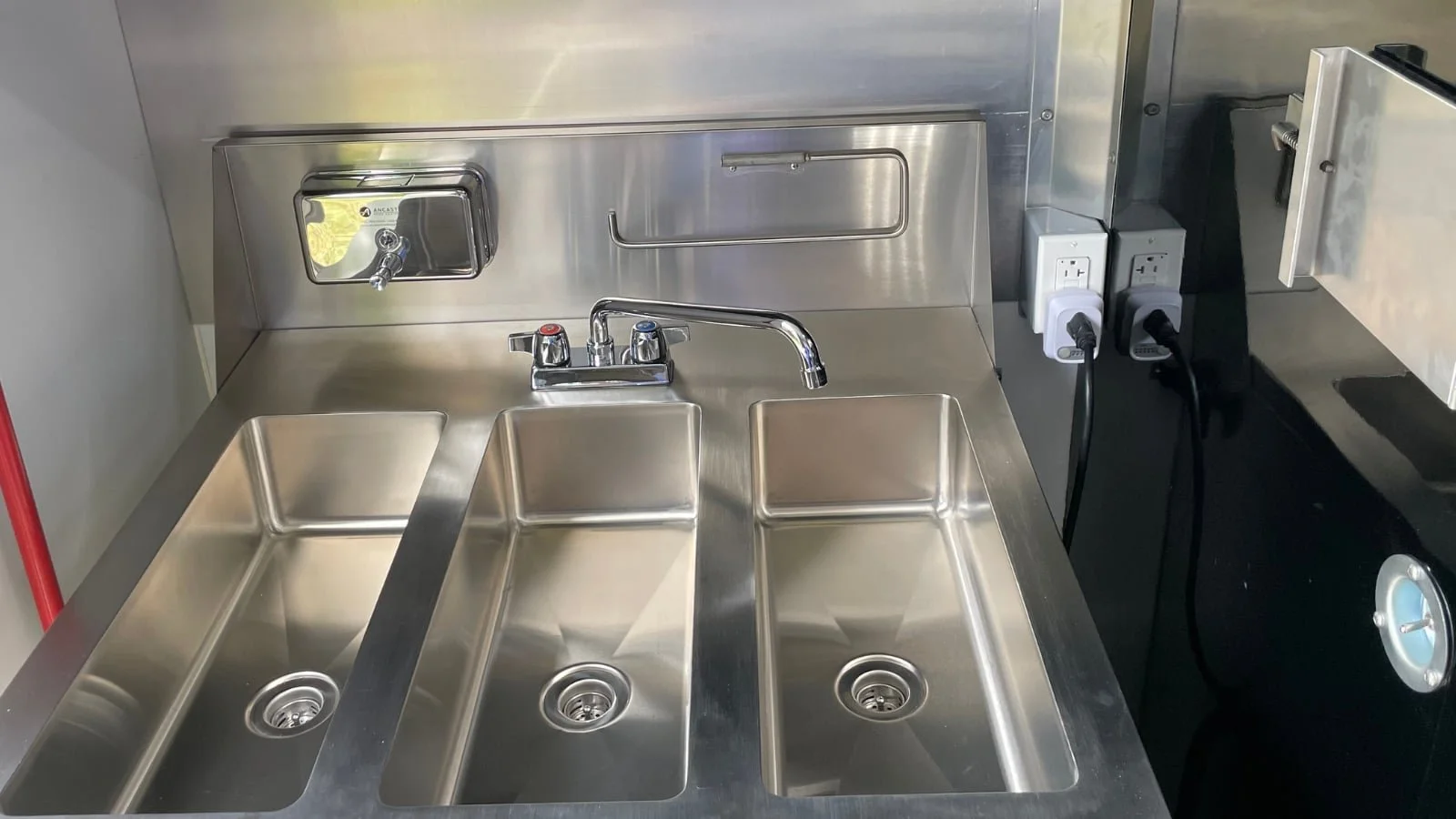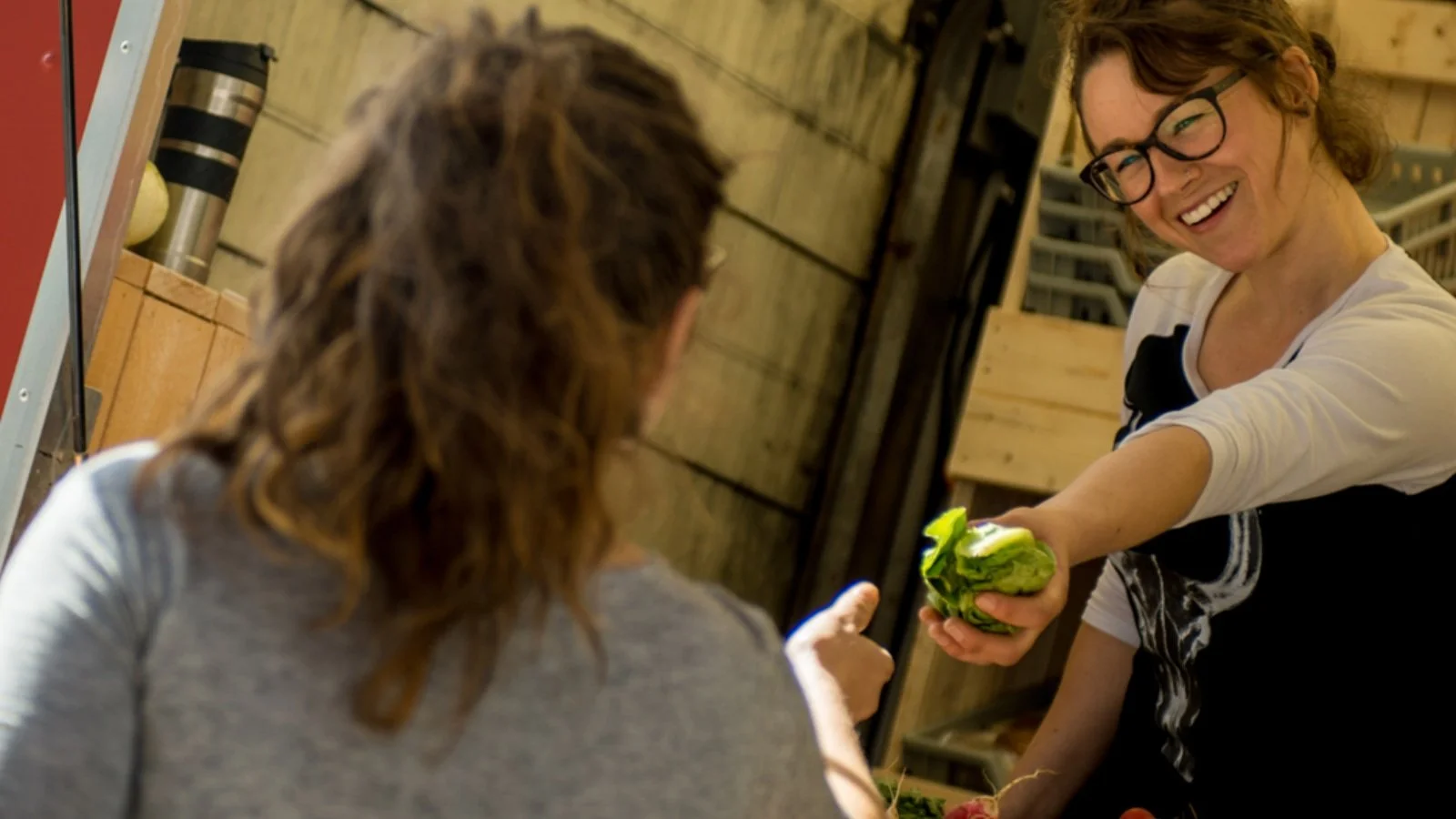Seattle Mobile Produce Market Nourishes Community Beyond Meal Access
A mobile produce market has knocked down barriers and opened doors for a Seattle-based social enterprise nonprofit.
FareStart has operated a mobile market since 2021 when it purchased a Farmers’ Truck to bring fresh, healthy food to those in need. The program is now helping thousands of families to access fresh, affordable, seasonal produce.
“I think the way that our food system is currently set up, we don’t have a lack of food but what we have is a lack of proper supply chains to get food to everyone who needs it,” said Emily Penna, senior manager of food security initiatives at FareStart. “So, a lot of the ways I think about food security is really rooted in access. So, making sure that we can get the food to the communities that need it the most.”
FareStart offers many community services including culinary-based work readiness training, which was the basis of their program since inception 30 years ago. Now, they have a restaurant and cafes across Seattle, a box lunch program, and food security work through the community and school meals program.
With the help of farms and community partners, FareStart collects and purchases fresh food and staples and then redistributes them to communities with limited access to healthy and nutritious food.
FareStart got their Farmers’ Truck in 2021 as a way to pivot through COVID-19 and be able to continue feeding their community.
“It was really clear there were so many access needs beyond folks who needed meal access,” said Penna.
Truck Provided A Solution
Penna said FareStart was looking for a solution to not only addressed community food access but also make the work of employees much easier.
“We were using our delivery vans and shoving tables in there and shoving boxes in there,” she noted. “So, there was this really arduous process to just set up to be able to distribute food into the community. I think what really brought us to the Farmers’ Truck was we were looking around for an alternative option so it wasn’t so laborious to do all these pop-ups in places where really needed it. The Farmers’ Truck was really customizable, and really offered the solutions for the challenges we were facing.”
The truck was purchased with help from a family foundation and through a Washington State Department of Agriculture (WSDA) infrastructure grant. The whole mobile community market program was funded by Washington State for the first two years of the program. Today, the funding is more diverse with help from WSDA, private philanthropy, and purchasing funds to work with local farmers.
Community Impact
Last year, more than 7,000 households were served by the mobile community market and more than 300 markets at various sites have been held since 2021. This year, FareStart relaunched the mobile community market through a remodeled pay system to ensure the sustainability of the program.
Customers can access free or discounted produce through:
Supplemental Nutrition Assistance Program/Electronic Benefit Transfer (SNAP/EBT) benefits
Washington State Food Assistance Program (WFAP)
FareStart gift cards
Credit and debit cards
FareStart vouchers offered through partnerships with other food security and food recovery organizations
“As we’re setting the pricing for the truck, we’re able to keep our prices relatively low…because of those purchasing dollars. We also have a unique model…where we’re able to continue distributing food for free even though we’re functioning on a pay model through a voucher model.”
The vouchers are given to local human service providers and community partners who distribute to their clients. Some mobile markets have more than 100 people showing up with their vouchers. Penna says the average number of vouchers used depends on the event and the partners making the vouchers accessible for that event.
Partner Locations
The mobile community market runs from April to October. Some market stops are weekly, some are bi-weekly and others are monthly. There are as many as six markets a week.
Their mobile community market will stop at locations such as the local YMCA, the International Rescue Committee, a local college campus, and a community health center. Penna highlighted a recent market stop at a health center in conjunction with Coordinated Care and Health Point.
“We had this beautiful market with them - we do it once a month - and they are able to set up this beautiful pop-up fair of other providers,” said Penna. “The King County Public Library was there giving away free books for kids that were all about vegetables. It was also Alzheimer’s Month so they had someone doing healthy foods for brain health.
“That’s really the idea to have these partners who are rooted in the community, working with them to figure out what are the other needs that people have and how can we really make this feel like a festive atmosphere where people are maybe going to their doctor’s appointment and then access all these other needs that they have at the same time.”
Teaming Up With Healthcare Services
She said partnering with healthcare providers and making mobile market stops at these locations is a great fit.
“As far as partnering with different health clinics…food access is a huge part of health for people so it kind of made sense. There are so many people that are doing social determinants of health screening at their clinics but then they don't necessarily have the resources to address those beyond maybe what their specialty is. So being able to give them a concrete food access solution has been really great for clinics. So, places like that could really expand on the Food As Medicine concept.”
Penna also noted that the new flexible pay model is attracting more people at the YMCA location.
“They have people who pay for their membership and they also kind of do flexible pay models. So, they just really got it right away and they were really excited to have the service come back in a way where all of their members, and even people beyond their members, could feel like they could participate in a program that was happening at the Y.”
Penna says the International Rescue Committee is a great partner location due in part to its farmer training program, ‘New Roots’, that's geared towards immigrants and refugees.
“We'd been purchasing from them and we’d been in conversation about setting up a market site with them. This was the year that we were finally able to launch it so it's really cool not only getting to purchase from the farmers in their training program but then also serve a broader range of their clientele that they work with. And it's really cool because they're in a spot that's highly visible.”
Food Procurement
FareStart has gleaning operations in partnership with five local farms in the Seattle area as well as two of the local farmers' markets. Students help to sort food at FareStart, and that also helps offset costs by offering a low price point on food.
They also partner with Cascadia Produce, which works with larger grocery store chains in the area, as well as farmers. Cascadia Produce will offer food to FareStart at a discounted price to ensure FareStart has quality produce all mobile market season.
“We have this diversified stream that we're purchasing from that's also reducing food waste in the system. That also allows us to maybe pay the higher premium prices from the farmers that we're also partnering with.”
Penna said stability buying from local farmers also means they can help plan which crops to grow for the following mobile market season. And the food that goes on the truck is usually what the customers want most, or are culturally appropriate.
“That's what's so cool about working with ‘New Roots’, for example. It’s the same different subpopulations that they're working within their farmer training program that we're serving so we can do really specialty crops…Being able to serve these niche populations not only in the immediate food access needs that they have but to also support those same immigrant populations and refugee populations to build in and be a part of the local food system.”
What Customers Are Saying
Penna says customers reach out to her sometimes just to say thanks, or tell her how they’ve enjoyed the market food.
“I have people email me pictures of things they’ve made from the truck. They’re like, ‘Thank you so much, these are different meals that I’ve made this week’.
“A lot of times in food security work, we’re talking about the pounds of food that we’re distributing. But really, what we’re able to do with this fresh produce truck is bring really nutrient-dense food options to people. Specifically thinking about Food As Medicine, being able to bring highly nutritious, hyper-local food to the community is just so exciting.”
Popular market foods include strawberries and mushrooms. And because FareStart works with so many chefs, they have expertise to help customers cook their food and turn it into healthy, tasty meals.
Penna says choice of food, flexible payment options, accessibility, and much more, make the mobile market appealing to many.
“I think for a lot of people, money is really tight but they’re not struggling enough to go to a food bank for whatever stigma reasons…So we think through our model we’re offering another alternative to folks who access food in a way that feels dignified,” said Penna.
Community and Festive Feel
Penna says mobile community markets are unique in that the community and festive feel is very palpable. She says relationships are formed with customers and people become friends and even volunteers in some cases.
“We had one woman who started coming to the market - she had been forced into early retirement because… of a car accident…She was going through surgeries so she would be there for a couple weeks and then we wouldn't see her for a little while… “Every time she would come through the line… she just brings so much good energy. One day randomly Damien, who is technically our driver but does so much more… he just kind of asked her, ‘Would you ever think about like volunteering with us?’… So, she turned from just like a customer coming to the market into one of our most loved volunteers just because of that energy that she brings.”
She said the user-friendly design of their Farmers’ Truck is also great to have volunteers step in.
“It’s just so easy to plug someone and play without having to teach them a whole system. It’s just very intuitive.”
Farmers’ Truck Experience
Penna noted that having a Farmers’ Truck on site feels different than a delivery vehicle or food truck. She says the experience feels elevated from both sides.
“For customers, it feels like a very elevated shopping experience. It doesn’t feel like a drive-through pop-up to get a free box of food. They can see everything and they really get a choice in what they’re getting.”
For staff, she said the truck’s layout and design are great for loading and unloading food.
“This work can be hard on people’s bodies but because of the way the truck is laid out it’s really easy for us to load up and keep things organized. If you’re just putting everything into a big delivery truck, you can’t necessarily organize it in a way where you can access everything easily. We load everything up and then we don’t have to touch it again until we’re ready to re-stock. The capacity of the truck really allows us to reduce the number of times we’re having to move things so that our staff aren’t putting as much wear and tear on their bodies.
“There’s so much opportunity for versatility to respond to the emergent needs of the community by being mobile. The way that the truck is laid out is so easy to plug and play somebody who’s maybe never been in it before.”
Impressive Truck Features
She said the 3-compartment sink is excellent for food prep and safety, and having a truck with refrigeration keeps things fresh and looking delicious.
“We’re able to refrigerate our back stock to make sure when it’s really hot in the summer and we’re out in a parking lot that the produce we’re putting out is still just as fresh as the original produce that people saw.”
She added that not needing a Commercial Driver’s Licence to drive the truck is a huge factor in this type of work.
“Our main driver does have a CDL but he’s one of our few drivers at FareStart that has that. But we have had other staff have to step in and drive the truck so it’s really nice being able to have someone step in and do that if Damien can’t be there.”
What the Future Holds
Penna concluded that she knows the mobile community market is making a big difference in people’s lives. She added that everyone at FareStart is proud of the work they’re doing.
“For me, food security is particularly important thinking about it wholistically along the supply chain, there are so many local farms and their goal is to feed people nutritious food. Feeding people who have the least access is the most righteous cause for a potato, or a carrot, or any vegetable you can put out there. To give that food to those who need it most is the highest honor for that piece of fruit or vegetable.
“Seeing the light in people’s eyes when they see all that produce out there - I think that’s the best feeling in the world. I think everybody should have a mobile market truck.”

